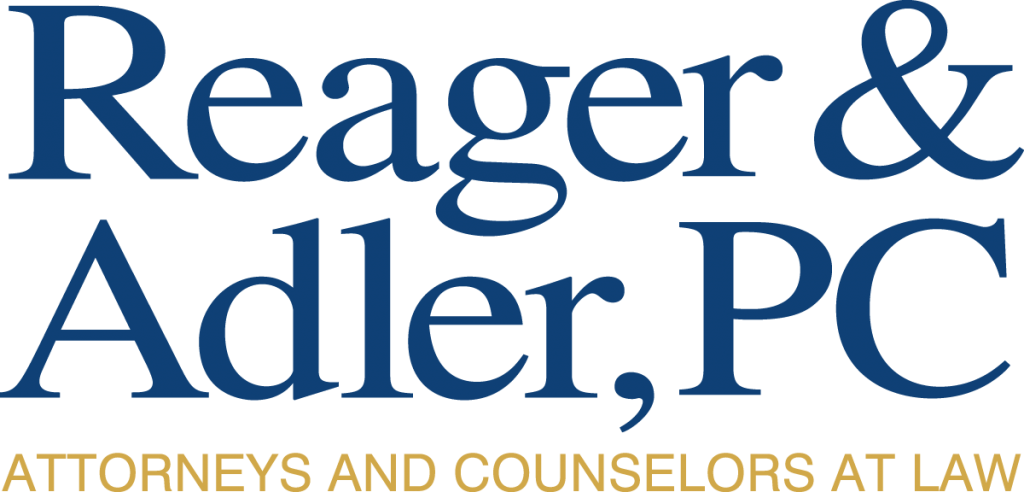 The term “estate planning” often brings to mind mansions, vacation properties, large stock portfolios, and even valuable art or jewelry. But the truth is that estate planning is not just for the wealthy, and not just for later in life. A comprehensive estate plan will cover much more than just the distribution of your property and assets. From medical directives, to arranging for care for your minor children and/or dependents, to naming a person to make decisions for you in the event of your incapacitation – at Reager & Adler, we believe that good estate planning is life planning.
The term “estate planning” often brings to mind mansions, vacation properties, large stock portfolios, and even valuable art or jewelry. But the truth is that estate planning is not just for the wealthy, and not just for later in life. A comprehensive estate plan will cover much more than just the distribution of your property and assets. From medical directives, to arranging for care for your minor children and/or dependents, to naming a person to make decisions for you in the event of your incapacitation – at Reager & Adler, we believe that good estate planning is life planning.
Regardless of your financial or personal circumstances, we want to provide you with the peace of mind that comes from having your personal and financial affairs in order. Read on to discover why estate planning is critical at any stage of life.
1. Plan for Your Own Needs
n estate plan should cover much more than just the distribution of your assets after your death. A crucial part of the planning process involves arranging for your own care and the management of your affairs in the event that you become unable to do so. This may involve creating a durable power of attorney, naming someone who can make legal and financial decisions for you, or planning for potential medical decisions in the form of an advanced directive.
Your estate plan may need to be modified over time as your circumstances change. The estate planning attorneys at Reager & Adler will review your current situation to determine what life circumstances need to be addressed immediately, and plan for potential future events. With our companion practice areas – business planning, real estate, elder law, and estate administration – we are ready to help you navigate whatever situations may arise.
2. Organize Your Financial and Legal Affairs
In many cases, the main component of your estate plan will likely be a will, which names an executor for your estate and directs how to distribute your property. Financial assets with named beneficiaries – such as retirement accounts, annuities, or life insurance policies – do not need to be included in your will. However, the estate planning process should include the identification of all assets so that you can make informed decisions about your property distribution.
Depending on the size and complexity of your estate, other strategies aimed at protecting your wealth or preserving family wealth over the long term may be appropriate. Our estate planning practice works collaboratively with financial advisors, accountants, and other professionals as needed to deliver truly customized solutions based on your unique circumstances.
3. Provide for Minor Children or Dependents
It’s never too early to start the estate planning process, particularly if you have minor children or other dependents. If you die without a surviving spouse, and without leaving a written directive as to who will care for your children, a guardian will be appointed by the court. In the absence of a family member, or any other person (such as a family friend) who steps forward to serve as a guardian, the child can become a ward of the state and end up in the foster care system.
You can identify in your will the person(s) you wish to care for your children in the event that you die without a surviving spouse. You may also wish to name an alternate, in case the first person listed is not available.
4. Minimize the Tax Burden
While federal estate taxes impact only those with an estate over $12,060,000 in 2022 ($24,120,000 for couples), estate and/or inheritance taxes may be imposed by the states. Estate taxes are assessed and paid for by the estate, while inheritance taxes are paid by heirs. Pennsylvania imposes an inheritance tax of between 4.5% and 15%.
Careful estate planning can help you move assets out of your estate by making gifts, establishing trusts or joint accounts, or moving assets into investment accounts with named beneficiaries. At Reager & Adler, our collaborative approach means that we’ll work with your financial advisor and accountants to minimize the tax burdens.
5. Include Charitable Giving
Philanthropy is frequently a component of the estate planning process, whether motivated by a desire to leave a legacy, continue family traditions, or support important causes. Philanthropic giving, whether during your lifetime or after your death, may also reduce the tax burden to you or your heirs. Our estate planning attorneys can help you narrow your focus and review what type and timing of your charitable giving will best meet your needs and support the causes that are meaningful to you.
6. Avoid or Minimize a Lengthy Probate Process
If you die without a will, the intestate laws of the state where you live and own property will determine what happens to your assets. Even if your financial and family situation seems relatively simple, the probate process can be lengthy and expensive – and your assets are frozen until it is completed. The costs of lawyers and court appearances will be deducted from your estate which can be a significant burden on your survivors.
By taking the time to create a will, name an executor, and ensure that all of your investment accounts have named beneficiaries, you can minimize the burden of probate on your loved ones.
Contact Us Today
At Reager & Adler, our Estate Planning, Administration, and Elder Law practices are fully integrated to provide you with truly seamless lifetime estate management. We have more than 45 years of combined experience in these areas, led by a partner who is an accredited estate planner. From our offices in Camp Hill, PA, we’ve helped countless clients across Pennsylvania from all walks of life develop customized estate plans to meet their needs. We pride ourselves on developing lifelong relationships with our clients.
We believe that thorough planning can prevent later costs and hardships and provide you and your loved ones with peace of mind. Contact us today for a confidential consultation.

Susan H. Confair, Attorney
Reager & Adler, P.C.
2331 Market Street
Camp Hill Pa. 17011
(717) 909-6936
sconfair@reageradlerpc.com

